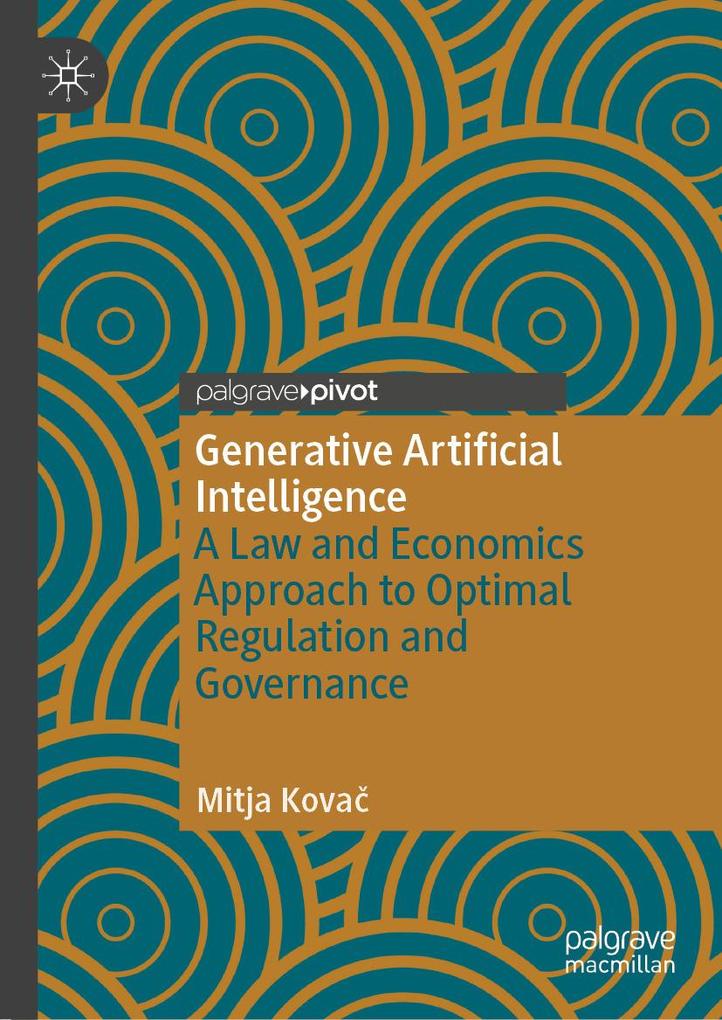
Sofort lieferbar (Download)
"AI is guaranteed to change nearly every aspect of our lives, but predicting how it will do so and determining what role law and regulation should play involve huge uncertainty. Kovac gives us an insightful roadmap, using the tools of law and economics, to our bewildering future. In the process, he also provides a comprehensive and necessary guide to understanding the regulatory and legal challenges we will face in the very near future."
-Jonathan Klick, Charles A. Heimbold, Jr. Professor of Law, University of Pennsylvania and Erasmus Chair of Empirical Legal Studies, Erasmus University Rotterdam
This book takes a comparative law and economics approach to explore the role of public and private actors in regulating generative artificial intelligence. The book provides an introduction and context for the creation of new generative AI technologies, now understood to be the chief goal of the leading AI companies. As autonomous 'super-intelligences', these technologies are still an unknown entity which nevertheless have profound implications for liberal democracy, consumer choice mechanisms, mutual trust, and political legitimacy.
This book explores the deep challenges posed for lawmakers and how we can achieve an optimal form of regulation and governance of such unreliable technologies. Chapters investigate possible hybrid modes of regulation, such as a co-regulatory approach between private AI companies and public actors in addressing the issue of misinformation spread. It also explores mixed types of regulation toward research on new forms of AI, arguing that different levels of systemic risk posed by different technologies must be accounted for. Different contemporary and historical contexts for the regulation of unprecedented technical innovation are also considered, and new suggestions for policy are presented. This book is a timely resource which will be of interest to researchers and practitioners in economic governance, law and regulation, artificial intelligence, and comparative law.
Mitja Kovac is full time Professor of Civil and Commercial Law at the University of Ljubljana, School of Economics and Business, Ljubljana, Slovenia. He is also a visiting lecturer at the Erasmus University Rotterdam, The Netherlands, at University of Ghent, Belgium, at the ISM University of Management and Economics in Vilnius, Lithuania, and at University of Vienna, Austria. He publishes in the fields of comparative contract law and economics, new institutional economics, consumer protection, contract theory and competition law and economics.
Inhaltsverzeichnis
CHAPTER 1: Introduction. - Part I. Conceptual framework. - CHAPTER 2. Economic Analysis of Law . - CHAPTER 3. The Case for Regulatory Intervention and its Limits. - CHAPTER 4. Introduction to the Generative Artificial Intelligence Systems. - Part II. Generative Artificial Intelligence and Key Regulatory Questions. - CHAPTER 5. What can get wrong? . - CHAPTER 6. Key Regulatory Principles and Current Regulatory Approaches. - CHAPTER 7. Towards an Optimal Regulator: Critical Assessment of the EU Artificial Intelligence Act. - Epilogue.
Produktdetails
Erscheinungsdatum
07. Januar 2025
Sprache
englisch
Seitenanzahl
224
Dateigröße
2,92 MB
Reihe
Progress in Mathematics
Autor/Autorin
Mitja Kova
Verlag/Hersteller
Kopierschutz
mit Wasserzeichen versehen
Produktart
EBOOK
Dateiformat
PDF
ISBN
9783031655142
Entdecken Sie mehr
Bewertungen
0 Bewertungen
Es wurden noch keine Bewertungen abgegeben. Schreiben Sie die erste Bewertung zu "Generative Artificial Intelligence" und helfen Sie damit anderen bei der Kaufentscheidung.










